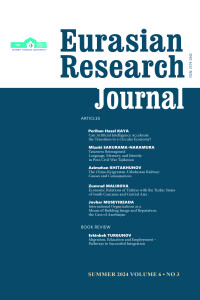Abstract
The world’s current model of economic development is unsustainable. It promotes the inappropriate use of limited natural resources, encourages consumption and waste, causing serious damage to the environment and generating large amounts of waste. The circular economy, an economic model in which resources are recycled and reused as much as possible by following a circular path rather than a linear path during consumption, has been gaining popularity around the world in recent years. Artificial intelligence (AI), one of the most important developments of our time, can also play an important role in the realisation of the circular economy. AI can complement and extend the skills of humans. It helps people learn faster, deal with complexities more effectively, and better understand the abundance of data. AI can facilitate new circular business models within the circular economy and help design sustainable and robust products. The aim of this study is to seek answers to questions such as how artificial intelligence contributes to the transition to a circular economy and whether artificial intelligence can accelerate the transition to a circular economy. While seeking answers to these questions, we argue that artificial intelligence has significant potential in the transition to a circular economy and will play an important role in this transition.
References
- Acerbi, Federica, Dai Andrew Forterre and Marco Taisch (2021). “Role of Artificial Intelligence in Circular Manufacturing: A Systematic Literature Review”. IFAC-PapersOnLine, 54(1): 367–372.
- Andrae Anders S.G. and Thomas Edler (2015). “On Global Electricity Usage of Communication Technology: Trends to 2030”. Challenges, 6(1): 117–157. doi: https://doi.org/10.3390/challe6010117
- Askoxylakis, Ioannis (2018). “A Framework for Pairing Circular Economy and the Internet of Things”. IEEE Int Conf Commun (ICC), 2018: 1–6. https://doi.org/10.1109/ICC.2018.8422488
- Bressanelli, Gianmarco, Federico Adrodegari, Marco Perona and Nicola Saccani (2018). “Exploring How Usage-Focused Business Models Enable Circular Economy Through Digital Technologies”. Sustainability, 10(3): 639. doi: https://doi.org/10.3390/su10030639
- Bughin, Jacques, Jeongmin Seong, James Manyika, Michael Chui and Raoul Joshi (2018). Notes from the AI frontier: Modeling the impact of AI on the world economy. McKinsey Global Institute, 4.
- Charnley, Fiona, Divya Tiwari, Windo Hutabarat, Mariale Moreno, Okechukwu Okorie and Ashutosh Tiwari (2019). “Simulation to enable a data-driven circular economy”. Sustainability, 11(12): 3379. doi: https://doi.org/10.3390/su11123379
- EC (2015). Closing the loop – Action Plan for the Circular Economy in the EU. Communication from the Commission to the European Parliament, The Council, The European Economic and Social Committee and The Committee of the Regions. Brussels, 2.12.2015 COM (2015) 614 final. Brussels: European Commission.
- Ellen MacArthur Foundation (2015). Growth Within: A Circular Economy Vision for a Competitive.
- Ellen MacArthur Foundation (2019). Artificial Intelligence and the Circular Economy.
- Esposito, Mark, Terence Tse and Khaled Soufani (2017). “Is the Circular Economy a New Fast Expanding Market?”. Thunderbird International Business Review, 59(1): 9-14.
- Gailhofer, Peter, Anke Herold, Cristina Urrutia, Sibylle Braungardt, Andreas R. Köhler, Cara-Sophie Scherf and Jan Peter Schemmel (2021). The role of Artificial Intelligence in the European Green Deal. Policy Department for Economic, Scientific and Quality of Life Policies Directorate-General for Internal Policies, 7. doi: https://doi.org/10.13140/RG.2.2.26789.22244
- IBM (2024). What is Artificial Intelligence? Retrieved from https://www.ibm.com/topics/artificial-intelligence. Accessed: 13.07.2024.
- Jiang, Yuchen, Xiang Li, Hao Luo, Shen Yin and Okyay Kaynak (2022). “Quo Vadis Artificial Intelligence?”, Disvcover, 2:4. doi: https://doi.org/10.1007/s44163-022-00022-8
- Jones, Nicola (2018). “How to Stop Data Centres from Gobbling up the World’s Electricity”. Nature, 561(7722): 163–166. https://doi.org/10.1038/d41586-018-06610-y
- Jurgilevich, Alexandra, Traci Birge, Johanna Kentala-Lehtonen, Kaisa Korhonen-Kurki, Janna Pietikäinen, Laura Saikku and Hanna Schösler (2016). “Transition towards Circular Economy in the Food System”. Sustainability, 8(1): 69.
- Moore, Darrel (2021). China trials AI-enabled sorting machines to keep plastic in circular economy. Retrieved from: https://www.circularonline.co.uk/news/china-trials-ai-enabled-sorting-machinesto-keep-plastic-in-circular-economy/. Accessed: 13.07.2024.
- Murray, Alan, Keith Skene and Kathryn Haynes (2017). “The Circular Economy: An Interdisciplinary Exploration of the Concept and Its Application in a Global Context”. Journal of Business Ethics, 140(3): 369-380.
- OECD (2019). Business Models for the Circular Economy: Opportunities and Challenges for Policy. Paris: OECD Publishing. OECD (2020). Environment at a Glance 2020. Paris: OECD Publishing.
- Onder, Huseyin (2018). “Sürdürülebilir kalkınma anlayışında yeni bir kavram: Döngüsel ekonomi”. Dumlupınar Üniversitesi Sosyal Bilimler Dergisi, 57: 196-204.
- Pathan, Muhammad Salman, Edana Richardson, Edgar Galvan and Peter Mooney (2023). “The Role of Artificial Intelligence within Circular Economy Activities – A View from Ireland”, Sustainability, 15: 9451. https://doi.org/10.3390/su15129451
- Sophie Scherf and Jan Peter Schemmel (2021). The role of Artificial Intelligence in the European Green Deal. Policy Department for Economic, Scientific and Quality of Life Policies Directorate-General for Internal Policies, 7. doi: https://doi.org/10.13140/RG.2.2.26789.22244
- Stankovic, Mirjana, Ravi Gupta and Juan E. Figueroa (2017). Industry 4.0: Opportunities behind the challenge. UNIDO General Conference, V.17.
- Valavanidis, Athanasios (2023). “Artificial Intelligence (AI) Applications. Τhe most important technology we ever develop and we must ensure it is safe and beneficial to human civilization”. Retrieved from https://www.researchgate.net/publication/369914014_Artificial_Intelligence_AI_Applications_The_most_important_technology_we_ever_develop_and_we_must_ensure_it_is_safe_and_beneficial_to_human_civilization_I. Accessed: 13.07.2024.
- Zota, Razvan Daniel, Ruxandra Constantinescu and Ioana Ilie-Nemedi (2023). “Use and Design of Chatbots for the Circular Economy”. Sensors, 23(1): 120. doi: https://doi.org/10.3390/s23010120
Details
| Primary Language | English |
|---|---|
| Subjects | Economic Theory (Other) |
| Journal Section | Research Articles |
| Authors | |
| Publication Date | July 31, 2024 |
| Submission Date | April 30, 2024 |
| Acceptance Date | July 18, 2024 |
| Published in Issue | Year 2024 Volume: 6 Issue: 3 |


